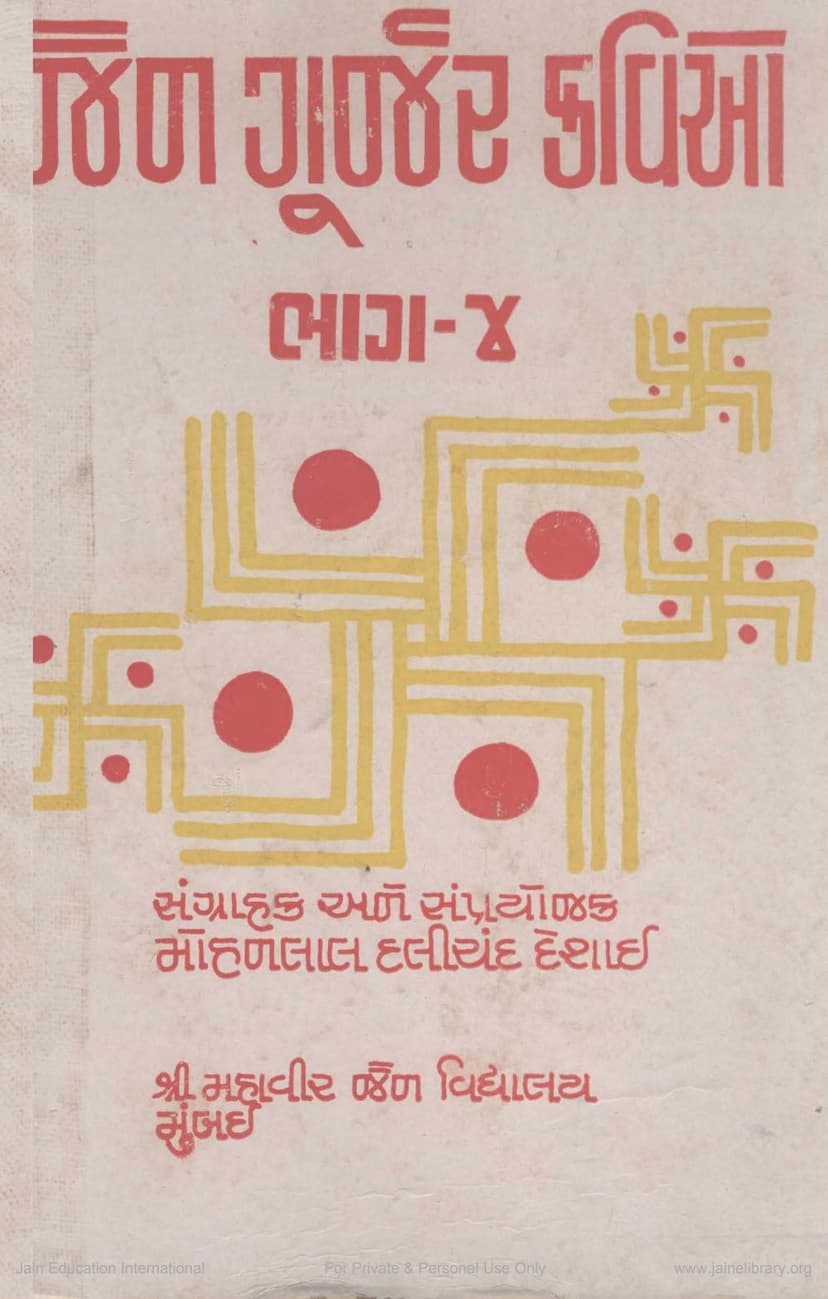Jain Gurjar Kavio Part 04
Added to library: September 2, 2025

Summary
Here's a comprehensive summary of the Jain text "Jain Gurjar Kavio Part 04," based on the provided pages:
Book Title: Jain Gurjar Kavio Part 04 Author(s): Mohanlal Dalichand Desai (Compiler and Publisher), Jayant Kothari (Editor of the Revised Edition) Publisher: Mahavir Jain Vidyalay, Mumbai Catalog Link: https://jainqq.org/explore/001033/1
Overview:
"Jain Gurjar Kavio Part 04" is the fourth volume in a series dedicated to cataloging and detailing the lives and works of Jain poets who composed in the Gujarati language. This particular volume focuses on the poets of the 18th century Vikram Samvat (approximately the 18th century CE) and presents a comprehensive descriptive catalog of Jain poets and their works from that era, in Gujarati language. It is the second, revised, and augmented edition, published in January 1988.
Key Features and Content:
-
Scope: The volume meticulously lists and describes Jain poets and their literary creations from the 18th century Vikram Samvat. It serves as a detailed catalog, providing a foundational resource for scholars and enthusiasts of Jain literature and Gujarati poetry.
-
Compilation and Editing:
- The initial compilation was done by Mohanlal Dalichand Desai, who also served as the publisher through Shri Mahavir Jain Vidyalay in Mumbai.
- The second edition was revised and augmented by Jayant Kothari, indicating a significant update and expansion of the original work.
-
Structure and Organization:
- Page 4 onwards: The book begins with an explanation of symbolic characters (સાંકેતિક અક્ષરોની સમજ) used in the catalog. These symbols refer to various manuscript repositories, libraries, and collections where the works are housed. This is crucial for researchers as it directs them to the primary sources. Examples include:
- અજીમગંજ નેમનાથ ભંડાર (Ajimganj Nemnath Bhandar)
- અભયસિંહ (Abhayasingh) associated with પાલીતાણુંની પેઢી (Palitana's institution)
- આ.ક.ભ. (શેઠ આણંદજી કલ્યાણજીની પેઢી, અમદાવાદ) (A.K.Bh. - Anandji Kalyanji Pedi, Ahmedabad)
- કમલમુનિ (Kamalmuni)
- ગુલાબવિજય ભંડાર, ઉદયપુર (Gulabvijay Bhandar, Udaipur)
- જેસ.મં. (જેસલમેર ભંડાર) (Jes.Man. - Jaisalmer Bhandar)
- ટ્રેઝરી ઍવ જૈન ભંડારઝ, સંપા. ઉમાકાંત પી. શાહ (Treasures of Jain Bhandars, ed. Umakant P. Shah)
- ડા. ત્રિ. (ડા. ત્રિભવનદાસ પ્રશસ્તિસંગ્ર" (Dr. Tri. - Dr. Tribhuvandas Prashasti Sangrah)
- રાધનપુર ભંડાર (Radhanpur Bhandar)
- મુંબઈની રીયલ એશિયાટિક સોસાયટી (Mumbai's Royal Asiatic Society)
- વિકાનેર ભંડાર (Bikaner Bhandar)
- And many others, often abbreviated.
- Page 6 onwards: There is a section detailing Important Corrections (મહત્વની શુદ્ધિવૃદ્ધિ), highlighting the dedication and effort involved in ensuring the accuracy of the text, with a special mention of Dr. Harivallabh Bhayani's significant contribution.
- Page 8 onwards: The main body of the work begins with an Index (અનુક્રમણિકા) that lists numerous Jain poets by their serial number and name, starting from 835. Dharma Simha, Anandghan, Vinayavijay Upadhyay, Jayanag-Jetasi, etc., are listed with their respective page numbers, indicating the extent of detail provided for each poet.
- Page 4 onwards: The book begins with an explanation of symbolic characters (સાંકેતિક અક્ષરોની સમજ) used in the catalog. These symbols refer to various manuscript repositories, libraries, and collections where the works are housed. This is crucial for researchers as it directs them to the primary sources. Examples include:
-
Content - Poets and Works (Examples): The book delves into individual poets, providing information about their lineage, gurus, specific works (often including titles, number of verses, and details of manuscripts or publications). Some prominent examples encountered in the provided pages include:
- Dharma Simha (ધર્માસિહ): Mentioned with details about his parentage, disciples, and specific works like "Dharma Singha Bavani."
- Anandghan (આનંદઘન): Described as a significant spiritual poet, his works like "Chovisi" (24 Jinastavans) and "Adhyatma Bahetari" are detailed. The text discusses the clarity yet profoundness of his language, comparing his poetry favorably to that of Kabir and Nanak. It also touches upon legends surrounding him and his primary residence in Medta.
- Vinayavijay Upadhyay (વિનયવિજય ઉપા.): A prolific poet with an extensive list of works in Sanskrit and Gujarati, including commentaries on scriptures, stanzas, and descriptive pieces like "Suratna Mandira nu Varnan" and "Nemnath Bhramarageeta Stavana." His guru lineage and significant disciples are also noted.
- Jayanag-Jetasi (જયરંગ-જેતસી): Mentioned with works like "Dashavaikalika Sarva Adhyayana Geeta" and "Amarsena Vairasena Chopai."
- Jnan Sagar (જ્ઞાનસાગર): His works include "Shukraj Ras" and "Dhmmil Ras."
- And many others, listed with their respective page numbers, showcasing the sheer volume of information contained within. The indexed poets cover a wide range of spiritual, philosophical, and narrative themes, reflecting the rich literary tradition of Jainism in Gujarat.
-
Editorial and Publishing Details:
- The publisher, Shri Mahavir Jain Vidyalay, Mumbai, is clearly identified.
- The edition is stated to be the second, revised, and augmented edition (બીજી સંશોધિત આવૃત્તિ), published in January 1988.
- The price was ₹90, with a print run of 500 copies.
- The cover design was by Shailesh Modi.
- A list of vendors (વિક્રેતાઓ) across Mumbai and Ahmedabad is provided.
- The printer was Bhagvati Mudranalay, Ahmedabad.
-
Significance: The book is a valuable scholarly resource, providing a systematic and detailed catalog of Jain poets and their works from a specific historical period. The inclusion of symbolic characters for manuscript locations and important corrections highlights its academic rigor and practical utility for researchers. The sheer number of poets and works listed suggests a deeply embedded literary tradition within the Jain community in Gujarat during the 18th century.
In essence, "Jain Gurjar Kavio Part 04" is a monumental work of scholarship, preserving and presenting the rich literary heritage of Jain poets from 18th century Gujarat. It serves as an indispensable reference for understanding the historical development of Jain literature in the Gujarati language.